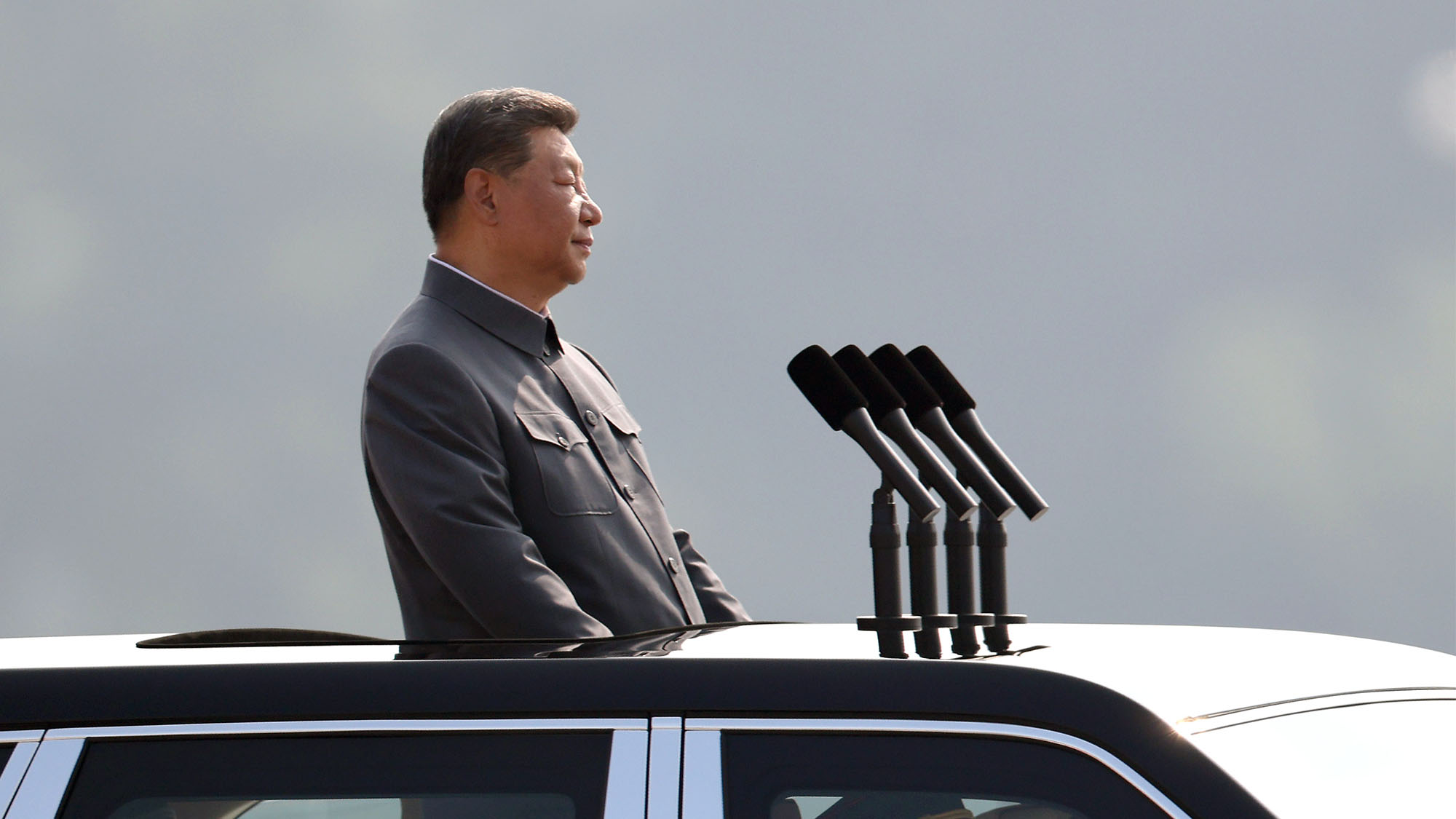The basic assumption of tax reform is wrong
To get a stronger economy, let's try increasing taxes on the rich

President Trump and the Republican Congress are reportedly working on tax reform. This is almost certainly code for "huge tax cuts for rich people — especially ones like Donald Trump." But they'll probably try to sell the cuts as unleashing turbocharged growth.
But Republicans will run into two big problems. The first is that Trump's tax cuts will probably be so preposterously tilted towards the rich that this argument won't carry much weight. Second, and perhaps more importantly, the case that additional tax cuts will do anything positive for the economy — especially cuts for investment and corporations — is extremely weak. In fact, there is a strong circumstantial case that we should try the opposite: increased taxes.
The way tax cuts are supposed to help the economy is through incentives to work, spend, and invest. If you get to keep more of your pay, you might work harder, and then have more money to spend on things. (If "distortions" like tax loopholes are removed, that work will then be channeled in more productive directions.) Meanwhile, with taxes on corporate earnings and investment reduced, firms will invest more, increasing the prospect for future growth.
The Week
Escape your echo chamber. Get the facts behind the news, plus analysis from multiple perspectives.

Sign up for The Week's Free Newsletters
From our morning news briefing to a weekly Good News Newsletter, get the best of The Week delivered directly to your inbox.
From our morning news briefing to a weekly Good News Newsletter, get the best of The Week delivered directly to your inbox.
In the frictionless-planes model world of neoliberal economics, this makes sense. But in the real world, it's not so simple.
Over the past 25 years, America has run two big national experiments with taxes. During Bill Clinton's early presidency, taxes were raised substantially, especially on the rich. During George W. Bush's early presidency, taxes were cut even more, again on the rich. Both times conservatives loudly promised that the incentive effects mentioned above would be tremendous — that Clinton's tax increase would strangle the economy, while Bush's would unleash an explosion of prosperity.
The results were precisely the opposite of these predictions. The late '90s boom was the fastest economic growth in decades — with stable inflation to boot. Conversely, the Bush economy was the weakest expansion in postwar history to date, and capped off with the worst economic disaster since the Great Depression.
Why might this be? One possible answer can be found on the corporate and investment side of the tax ledger. Careful examination of the effects of the Bush dividend tax cut by economist Danny Yagan found no increase in investment whatsoever. Further work by economists Marshall Steinbaum and Eric Bernstein finds that corporate tax cuts in general do not have the advertised effect. Finally, work by economist J.W. Mason finds all this as part and parcel of a broader restructuring of corporations away from investment and towards shareholder payouts.
A free daily email with the biggest news stories of the day – and the best features from TheWeek.com
And while one should be careful about drawing ironclad conclusions from this, the fact is that the pathetically weak post-2008 growth has also featured historically low corporate investment.
That in turn has probably been exacerbated by sharp declines in the top marginal tax rates — which used to be over 90 percent in Eisenhower's day. In a way, the neoliberals are even more right than they knew. It turns out that when you cut taxes on the rich, they don't just put in more hours at work — they restructure whole companies to take more of the corporate surplus for themselves, leaving less for investment and labor. As Mike Konczal and Bryce Covert write, "Taxes don’t just produce revenue; they are capable of restructuring how the whole economy works."
Finally, all these flavors of tax cuts naturally increase income inequality, and there is a good argument that high inequality itself is a structural drag on growth. Because rich people save more than poor ones, an economy based on mass consumption will struggle to reconcile full employment with increasing inequality. America did so only by building up a huge debt bubble, which can only work for so long. And after the bubble popped, consumers were left with a large debt overhang, thus worsening the ensuing recovery.
There's little chance Trump's tax cuts can be stopped. But next time Democrats are in power, they should not hesitate to reverse them and go much further. "Instead, of re-running the same failed policy one more time, perhaps the route to increasing corporate investment in the economy is to raise the effective tax rate corporations and their shareholders pay. Then they wouldn't face such a strong incentive to suck money out of the economy," Steinbaum told The Week. Chances are good we can have our egalitarian tax policy cake and eat it too.
Ryan Cooper is a national correspondent at TheWeek.com. His work has appeared in the Washington Monthly, The New Republic, and the Washington Post.
-
 Quiz of The Week: 24 – 30 January
Quiz of The Week: 24 – 30 JanuaryQuiz Have you been paying attention to The Week’s news?
-
 The Week Unwrapped: Why is China clearing out its generals?
The Week Unwrapped: Why is China clearing out its generals?Podcast Plus, can the Conservatives win back the centre? And what’s gone wrong with Britain’s hearing aids?
-
 The week’s best photos
The week’s best photosIn Pictures A Viking festival, an inky fingerprint, and more
-
 The billionaires’ wealth tax: a catastrophe for California?
The billionaires’ wealth tax: a catastrophe for California?Talking Point Peter Thiel and Larry Page preparing to change state residency
-
 Bari Weiss’ ‘60 Minutes’ scandal is about more than one report
Bari Weiss’ ‘60 Minutes’ scandal is about more than one reportIN THE SPOTLIGHT By blocking an approved segment on a controversial prison holding US deportees in El Salvador, the editor-in-chief of CBS News has become the main story
-
 Has Zohran Mamdani shown the Democrats how to win again?
Has Zohran Mamdani shown the Democrats how to win again?Today’s Big Question New York City mayoral election touted as victory for left-wing populists but moderate centrist wins elsewhere present more complex path for Democratic Party
-
 Millions turn out for anti-Trump ‘No Kings’ rallies
Millions turn out for anti-Trump ‘No Kings’ ralliesSpeed Read An estimated 7 million people participated, 2 million more than at the first ‘No Kings’ protest in June
-
 Ghislaine Maxwell: angling for a Trump pardon
Ghislaine Maxwell: angling for a Trump pardonTalking Point Convicted sex trafficker's testimony could shed new light on president's links to Jeffrey Epstein
-
 The last words and final moments of 40 presidents
The last words and final moments of 40 presidentsThe Explainer Some are eloquent quotes worthy of the holders of the highest office in the nation, and others... aren't
-
 The JFK files: the truth at last?
The JFK files: the truth at last?In The Spotlight More than 64,000 previously classified documents relating the 1963 assassination of John F. Kennedy have been released by the Trump administration
-
 'Seriously, not literally': how should the world take Donald Trump?
'Seriously, not literally': how should the world take Donald Trump?Today's big question White House rhetoric and reality look likely to become increasingly blurred
